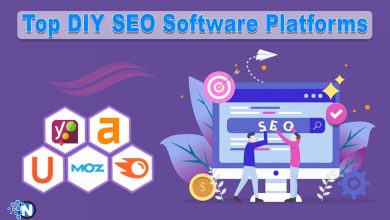Important Parts Of SEO – Search Engine Optimization
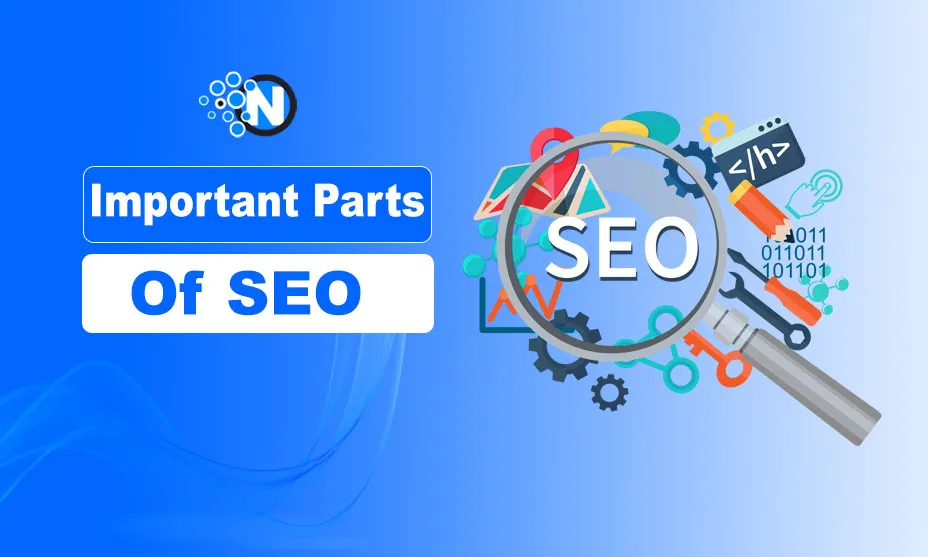
A key digital marketing tactic that raises a website’s exposure on search engines like Google is search engine optimization or SEO. You can raise your website’s search engine rating, attract more organic traffic, and eventually increase conversions by optimizing several aspects of it.
There are over 200 factors that define the rank that your website can receive in Google’s search engine results pages. However, it is beneficial to enhance each of these SEO elements, as some of the ranking factors are more beneficial or important than others.
Now, let me focus on the core elements of SEO and describe them.
Important Parts Of SEO
The three main parts of SEO are discussed in the below section in detail.
1. On-page SEO
Here are some important On-page SEO things that are important to take before going to publish content.
i) On-page SEO Content
A website’s content is essential to a successful search engine optimization strategy. It is important to think about what information your customers need while creating your website content. Since both search engines and your SEO depend on the length of a website’s content, adding text composed of at least 500 words is recommended. However, an ideal page length is around 1000+ words.
ii) Keywords
Keywords are search phrases that people use in search engines like Google to find a website. To appear in the organic search engine results, your content must have relevant keywords. A great keyword is one that receives a lot of searches on Google and is related to your industry.
In order to appear in SERPs, your keywords must appear in both the page title and the body copy of your website. Keywords should be included in your content as early as possible, preferably at the opening of your piece.
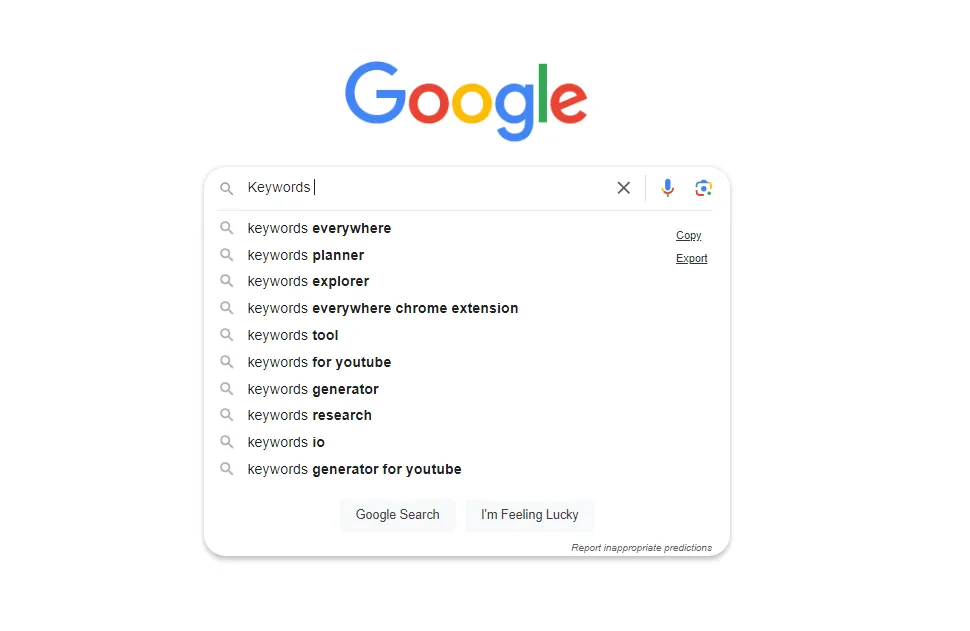
Fawad Malik (founder of nogentech.org) has written a detailed article about SEO Keyword Research Tips for Beginners to help freshers find the best keywords for SEO.
Noman Sarwar has also created a list of the Best Keyword Research Tools for SEO that webmasters and business owners can use to find the right keywords.
iii) Meta-description and Meta-title
The meta title appears on the search engine results pages (SERPS). The title must have at least 55 characters to appear fully in search results. One of the most important elements of a good meta title is to contain the three most important keywords you’re targeting while also clearly defining your company’s mission statement.
The meta description is the content that appears under your meta title on the search engine results page (SERP). There should be no more than 150 characters in this description, including spaces, and it should include your three primary keyword phrases. To entice readers to your website, your description must properly explain your business.
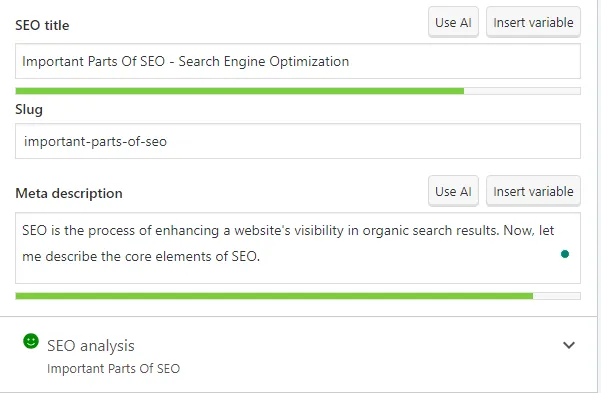
iv) E-A-T
The word E-A-T stands for three things: Expertise, authority, and trustworthiness. It’s important to show that you have followed Google E-A-T if you want to rank well. Let’s analyze E-A-T one component at a time:
- Expertise: The creator of a piece of material should have some knowledge of the subject matter.
- Authoritativeness: The reputation of your site’s total authority is referred to as its authoritativeness. The greatest way to convey authority is to have links and shares come from well-known sources.
- Trustworthiness: People should have faith in your website or business. Positive feedback, accurate information, and a secure website all reflect the credibility of the product or service.
Here, you can find some of the best Ways to Increase Your Content Authority for Google E-A-T.
2. Off-page SEO
Off-page SEO is a set of practices usually taken outside of your website to get enough results for search engine rankings.
i) Backlinks
It is a well-known fact that word-of-mouth can be the best form of advertising for any business. Getting other sources to write information about your company is what builds backlinks, yet it might be the most difficult component of SEO.
You should understand how to generate high-quality links from one blog. Good content and frequent publication of interesting news promote backlinks for your website, which in turn encourages other people to evaluate or discuss your business.
There are different Effective Link Building Strategies you can opt for to create high quality backlinks for your website to rank higher.
ii) Social Media Marketing
Social media marketing is one of the best ways to promote your business and improve SEO rankings. Reaching specific goals and marketing businesses and services via social media is beneficial.
Here are some ideas for distributing your content through social media.
- Share your content from your business’s social media accounts
- Build a social media following by posting regularly
- Add social sharing buttons to your website to make it easy for people to share your content.
- Write about topics that are trending on social media (and relevant to your business)
- Write attention-grabbing, share-worthy headlines
iii) Online Directories
Online directories give you the opportunity to be found on a wide range of websites and to collect feedback from your clients. Many new clients can be attracted to your business if you have a strong internet directory presence and have received favorable customer evaluations.
Negative reviews should also be reviewed and responded to since they can have a negative impact on your brand’s image and dissuade clients from using your website and/or services.
3. Technical SEO
Technical SEO is another essential part of SEO, and it is used to make sure your website meets the technical requirements of search engines. It plays a significant role in improving your organic rankings when done right.
Here are some key elements of technical SEO:

i) Crawling and Indexing
Crawling is when search engines discover your web pages. To make sure your site is easily crawlable, you need to create an SEO-friendly site architecture and use tools like XML sitemaps.
Once a page is crawled by the search engine bots, it should be indexed to appear in search results. If there is an indexing issue, you can fix it in Google Search Console.
ii) Site Structure and Navigation
A well-organized site structure enables search engines to understand and navigate your site. This includes having a clean hierarchy and making sure all pages are a few clicks away from the homepage. Proper internal linking also helps distribute page authority and makes it easier for search engines to find and index your content properly
iii) Page Speed and Performance
Faster-loading pages improve user experience and are ranked higher by search engines. You should optimize images, use browser caching, and minimize JavaScript to improve the load times of your website. Also, ensure your site has a mobile-friendly design, as mobile usability is a significant ranking factor.
iv) Security
Secure your site with HTTPS using a reliable SSL certificate to protect user data and improve trust. Search engines prefer sites with HTTPS protocol and rank them higher.
v) Errors Fixing
You should check and fix all website errors to ensure a smooth user experience. You can use Google Search Console to find and fix website errors effectively.
vi) XML Sitemaps and Robots.txt
Create and submit an XML sitemap to search engines to make sure they can find and index all your important pages. Also, use the robots.txt file to control which parts of your site search engines can crawl.
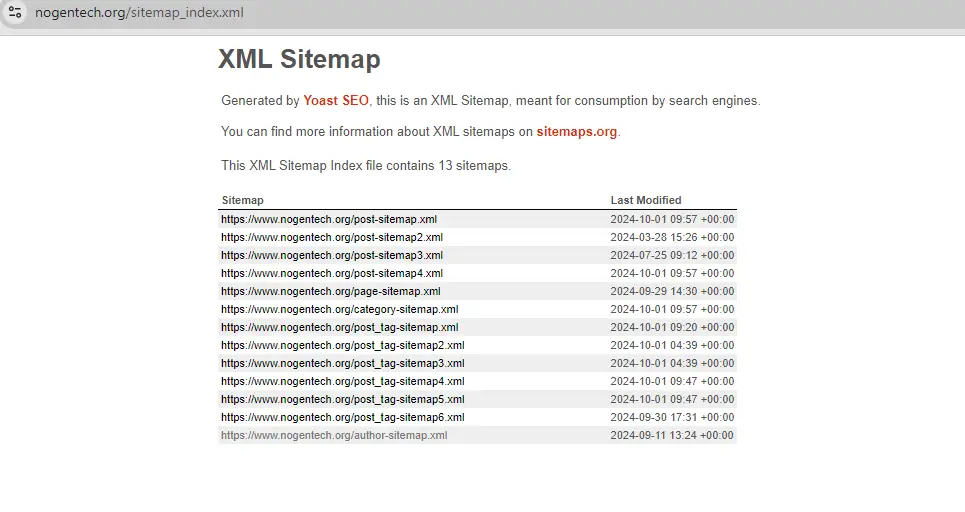
Final Thoughts
Understanding the important parts of SEO and implementing the right techniques helps brands reach their target audience effectively. Keyword research, content optimization, and linkbuilding are the core factors to increase the online visibility of your website or online store.
Moreover, technical SEO factors like avoiding website errors, improving user experience, increasing loading speed and using a mobile responsive design are also essential to secure a visible place in SERPs.




